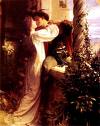Themes in Romeo and Juliet

Themes in Romeo and Juliet

After the play was analyzed in class, students derived these ideas:
1.People who act in a rash manner sometimes live to regret their actions.
2. Children are often victims of their parents' inflexible decisions.
3. Children do not understand that they sometimes need parental guidance.
4. Positive and negative human emotions, love and hate, are so closely related that one often leads to the other.
5. Suffering often causes alienation, but paradoxically it is often the only means that can bring people together.
CERTAINLY THEY DRAMATIZE WHAT HAROLD BLOOM MEANT: SHAKESPEARE INVENTED PERSONALITY.
A FINAL NOTE ON
SHAKESPEAREAN TRAGEDY
People usually expect to be entertained when they watch TV, go to the movies or see a play. Reading is no exception. Even though Shakespeare wrote plays to be seen and not read, the same rule applies, but there is a paradox. We usually think of a tragedy like Romeo and Juliet as having a said ending, and a comedy as having a happy one. The paradox, as Aristotle noted, is how we can be entertained from the suffering we read or see. He called this catharsis--an emotional relief, accompanied by pity and fear. Shakespeare knew this. His tragic plays reflect the mimetic idea that literature copies life. Romeo and Juliet came to a tragic end, partly due to their own rash actions, their parents’ hate, bad or incomplete advice, and just plain chance. They are “star-crossed”, and really do not have too much of an opportunity to make their lives work, but they are young and care for each other; we all can relate to that. Maybe a Shakespeare tragedy gives us a chance to see what happens to people who begin with the best of motive, but for many reasons fail. If they die knowing that they have accomplished something good--love, for example, however brief it may be, at least they have lived believing in something. We admire their courage in the face of adversity, and feel pity for their condition and fear because we too might experience a similar fate--literature does reflect life in both its tragic and comic elements.